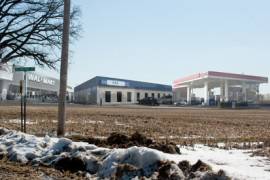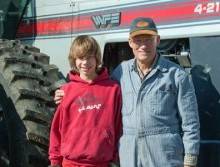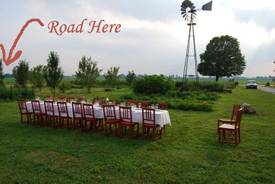
Sustainability: What Is It?
Sustainability is the capacity to endure. Quite romantic, when the thing you want to endure is your community. In simpler terms, sustainability is about relying on our own community for all of our basic needs. Namely, food. Most people realize that the strawberries they buy in January were not grown anywhere near Champaign-Urbana. Bananas do not grow in Mahomet.
For off-season produce to reach our markets, it has to be picked before it is ripe and then shipped here—often from hundreds of miles away—and then sometimes ripened through chemical procedures. 1-Methylcyclopropene: a cyclopropene derivative used as a synthetic plant growth regulator is used to slow down the ripening of fruit. The negative effect of this product on humans has been debated for years, but one thing that is not up for debate is who makes money from using it. Local growers? No. Local business? No. Us?… You get the point. But you can be certain that no man-made chemicals are in local, organic produce.
The task of making total sustainability a reality is daunting. I certainly don’t have time to grow and can my own vegetables. I can’t ride my bike every day–especially with my four-year-old on board. I like having a warm home in the winter, and I don’t have a wood-burning stove. But I can buy local produce, and here’s why we should.
Crap Stuff and Crap Stores
 Olympian Drive, according to its advocates, will bring new business to northern Urbana—so those passing by our city can stop one exit before Lincoln to get coffee, or a hamburger, or gulp drink, or gas. All of this commerce—that may or may not happen—will mean tax revenue for the city. To actually become revenue, the money it will take to build the road (several million dollars) and then build the businesses, will have to be subtracted, of course. So in several years, we might be able to call this plan “economic growth.”
Olympian Drive, according to its advocates, will bring new business to northern Urbana—so those passing by our city can stop one exit before Lincoln to get coffee, or a hamburger, or gulp drink, or gas. All of this commerce—that may or may not happen—will mean tax revenue for the city. To actually become revenue, the money it will take to build the road (several million dollars) and then build the businesses, will have to be subtracted, of course. So in several years, we might be able to call this plan “economic growth.”
What about the farms already there? Is this not economic growth: corn that feeds livestock, soy beans that power cars, cheese and milk that are sold in local markets, alfalfa, currants, raspberries, gooseberries, cherries, peaches, apples, goats…?
Am I missing something? Do we actually want pavement and parking lots more than we want local produce? Do we need tax revenue so badly that family heritage, such as the Ziegler family, no longer matters?
 If Olympian Drive is extended, the Zeigler family will lose 25 acres of their land. Land that has been in their family since 1865. The land will be taken by the government sometime this Fall, in the name of economic growth. Bill Ziegler says the land will be taken by “Quick Take” legislation, which means they will not be paid until after the land has been seized—at an unspecified time. With eminent domain, a price would have to be settled on before seizure of the land. Ziegler said, “It’s not about the money. The land is what’s important—and no amount of money would convince me to sell.”
If Olympian Drive is extended, the Zeigler family will lose 25 acres of their land. Land that has been in their family since 1865. The land will be taken by the government sometime this Fall, in the name of economic growth. Bill Ziegler says the land will be taken by “Quick Take” legislation, which means they will not be paid until after the land has been seized—at an unspecified time. With eminent domain, a price would have to be settled on before seizure of the land. Ziegler said, “It’s not about the money. The land is what’s important—and no amount of money would convince me to sell.”
Prairie Fruits Farm
 Leslie Cooperband, Extension Specialist in Sustainable Agriculture & Community Development at the U of I, and owner of Prairie Fruits Farm, calls the new road, “The embodiment of sprawl.” Urban sprawl is the spreading of a city into its outskirts; this spread forces city inhabitants to rely on automobiles for all aspects of daily life. According to Cooperband, most Urbana residents are for sustainability, not sprawl.
Leslie Cooperband, Extension Specialist in Sustainable Agriculture & Community Development at the U of I, and owner of Prairie Fruits Farm, calls the new road, “The embodiment of sprawl.” Urban sprawl is the spreading of a city into its outskirts; this spread forces city inhabitants to rely on automobiles for all aspects of daily life. According to Cooperband, most Urbana residents are for sustainability, not sprawl.
Greg Smith, owner of Nature’s Finest, Inc., agrees. Smith says the reason he chooses to farm and sell organic produce in Champaign-Urbana is because of “the quality of people here. Because we are a university town, we have an international flavor that is unique.”
I won’t go into detail on the Olympian Drive project since the parties interested have already done such a thorough job of presenting their argument. For further information, go here. You can also check out other Smile Politely articles on Olympian Drive here, here, and here.
So What? Why Should We Care?
Because we can go to local markets and buy produce that’s grown right here in Urbana, but if there is no longer enough land for farmers to make a profit from those sales, there will be no more produce for us to buy. No Farmers, No Food: We’ve all seen the bumper stickers. No farmers means no more Farmers’ Market, and we’ll all be buying year-old apples at the grocery store.
Tax revenue should not trump sustainability. Government and industrial growth is not sustainable. Once the road is paved and the stores are built, we can’t get the Ziegler farm back.
Local events, such as the evening dinners held at Prairie Fruits Farm will no longer be possible. There’s something very unappetizing about hearing and seeing (and smelling) cars drive by while you’re trying to eat―no matter how delicious the food is.

How Can We Help Support Local Sustainability?
Helping farmers keep their land is not going to be easy. The government officials seem to consider this a “done deal,” a “long-time-comin'” project. It is their “economic growth.” But since when do these agencies represent themselves and not us? We have to let them know what we want’—they certainly aren’t going to call us! It is incredibly easy to email the following public officials: Dick Durbin, Tim Johnson, and Roland Burris. Each has a contact form on their website. If they get enough emails, whoever is in charge of reading and sorting all of them might just think to tell them.
Buy Local
The Farmers’ Market in Urbana runs May through the first week of November, every Saturday, 7am–noon in the Lincoln Square parking lot. We can buy produce on the weekends—yes, it’s not as convenient or cheap as one-stop-shopping, but it’s for a great cause. Us! Champaign’s Farmers’ Market on Historic North First Street in Champaign runs June through August.
According to Greg Smith, the best information source on local sustainability and produce is LocalHarvest.org. From here you can search local produce suppliers and organic farmers by zip code.
Another website that offers information on local vendors is Prairie Land Community Supported Agriculture. According to their website, the Common Ground Food Co-op is the best place to buy local produce.
Grow Your Own
Easier said than done, considering Urbana’s tree population. Gardens need lots of sunlight—but to learn how to sow seeds, plant, harvest and all that, you can attend weekly classes at Farmtown, in Urbana. Classes for March include Seed Growing 102, March 27 at 10AM. Only $10 for supplies! I’ll be writing more on growing your own produce in future articles.
Be active. There are local forces against sustainability and it is up to us to educate them on the importance of local farmers. Call government officials. Remind them that we’re here.
Be involved. Local growers love to share their produce. Go out and buy some!








